Data Mapper Filter (Magic xpi 4.13)
A Data Mapper can have a large series of schemas on the Source or Destination or on both the sides. When working with large schemas, it is difficult to search for a particular node(s) and to view, create or delete its associated connection(s).
Here a Filter property provided on the Data Mapper window comes handy. It facilitates quick navigation and lets the user search for a node in the selected schema based on the name and/or data type of the node. It thereby restricts the panes to show only the data that the user is interested in.
The Filter property that is available on Source as well as Destination, has a combo-box to enter text to search for. By default, this combo-box is empty. Users can define their own filters and apply them on the corresponding side of the Mapper. Once applied, the filter will be stored to the filter history and will be available in the combo-box. The stored filters will be applicable for any Data Mapper step in the project.
The list of last 100 searches will be maintained. The list will only be available for the current Studio session and will not be preserved upon the Studio restart.
To clear or reset the filtered nodes, press Esc key.
When a filter is applied, on a given side, the following nodes will be shown:
· Nodes that match the filter of both complex type and leaf node, will be displayed. If the node is of complex type, it will be shown as collapsed.
· Parent nodes of the selected node will be displayed (preserving collapsed or expanded state as earlier). So, the final sub-tree will be displayed with all selected nodes and their paths to the root node.
· Connections links will be shown when nodes on both the sides are visible.
· Connections links will be shown for the nodes on either source or destination which are visible.
· Connection links will not be shown when the nodes on both sides are filtered out and are not visible.
The user can search for nodes of complex type as well as leaf nodes. The search can be by Name or by data type. The data types can be provided from list of <pre-defined prefixes>. The search by name and data type can be clubbed together to search node(s) with a name for the provided data type.
Search by Name
The search by name supports standard name matching as well as regular expressions. Multiple search values are also allowed and should be separated by a semi-colon. The search is not case sensitive.
By default the search will be a normal search. To search using regular expression, use the <R> filter prefix at the start of the search.
Search by Data Type
The search mechanism also supports filtering the nodes based on the data types. The supported data types have a corresponding prefix. The list of supported prefixes is given below:
The prefix should be enclosed within the “<” and “>” characters and always come at the beginning of the string. For example, <C>address
User can also append the node name to the prefix to search for nodes with the data type for the specified name.
|
|
|
|
<R>
|
The prefix denotes that the search string will be considered as regular expression. This prefix can be used in combination with any of the prefixes given below.
|
|
<+>
|
Shows all nodes with connections
|
|
<->
|
Shows all nodes without connections
|
|
<C>
|
Shows all complex nodes
|
|
<N>
|
Shows all numeric nodes
|
|
<A>
|
Shows all alpha nodes
|
|
<D>
|
Shows all date nodes
|
|
<T>
|
Shows all time nodes
|
|
<B>
|
Shows all blob nodes
|
|
<L>
|
Shows all logical nodes
|
Examples
-
Search by Name:
Search the XML for nodes with name equal to Phone
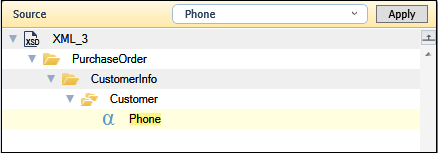
-
Search for Complex Nodes:
Search the XML for all nodes of complex type
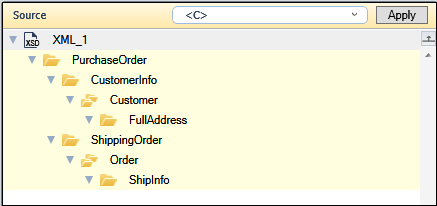
-
Search for Nodes of type Numeric or Date:
Search for leaf nodes of type as numeric or date
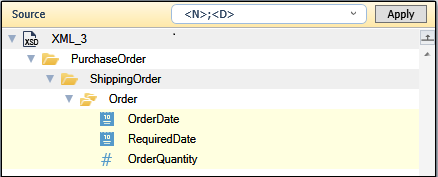
-
Search for Alpha Nodes with the given name:
Search for text nodes with name as City
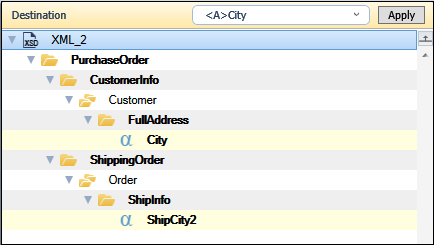
-
Search using regular expressions:
Search for node with digits in the node name
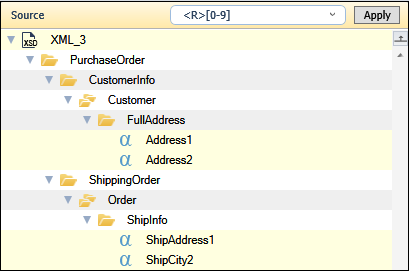
(Since version: 4.13)

